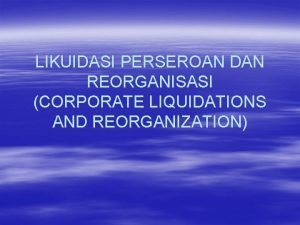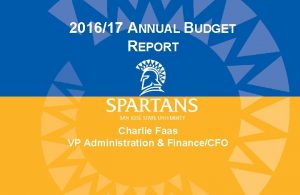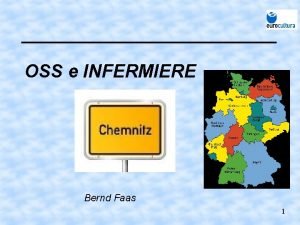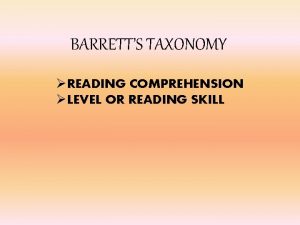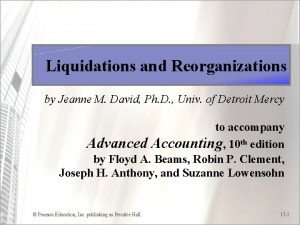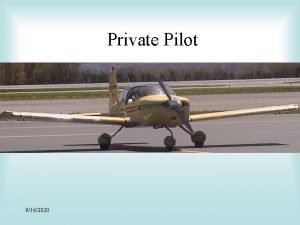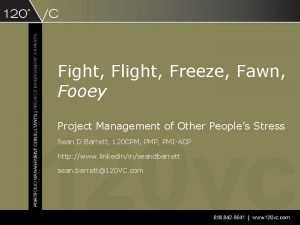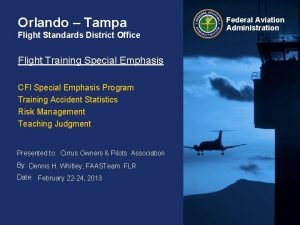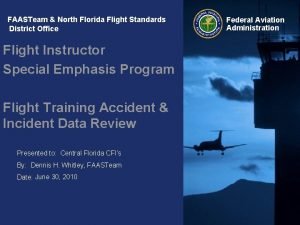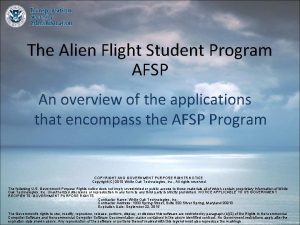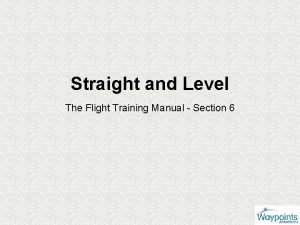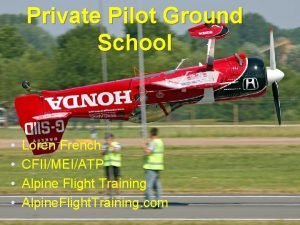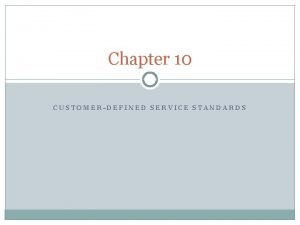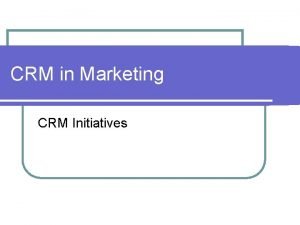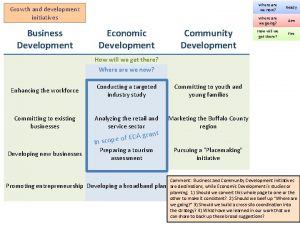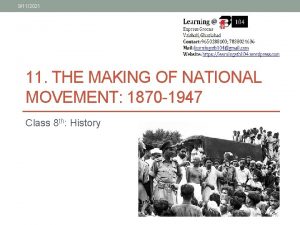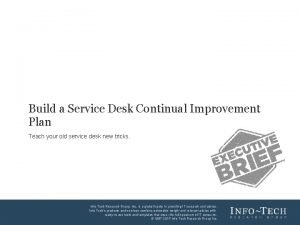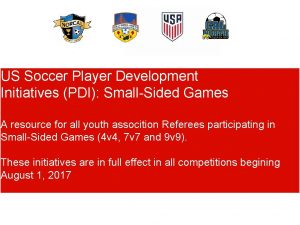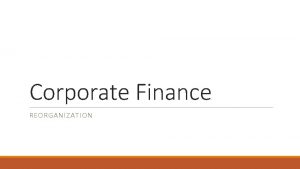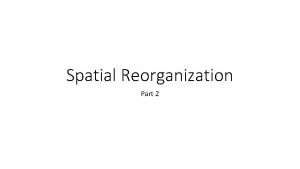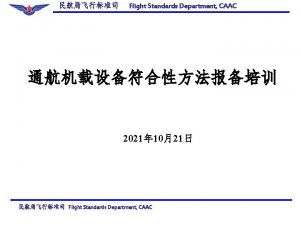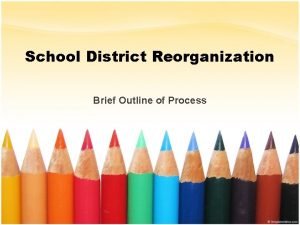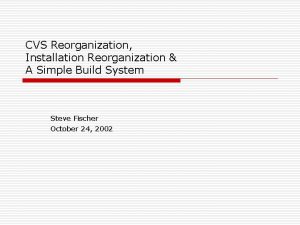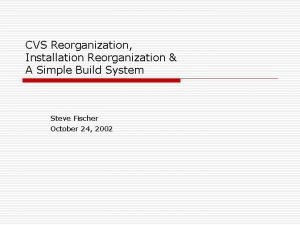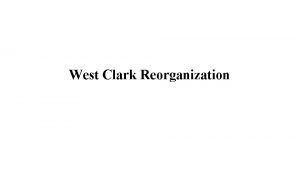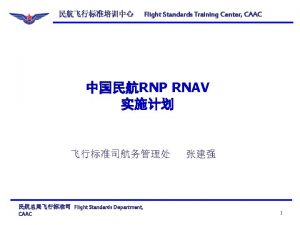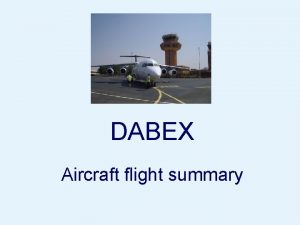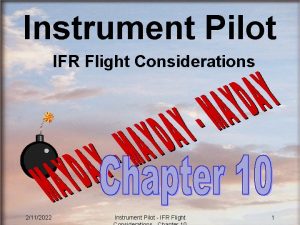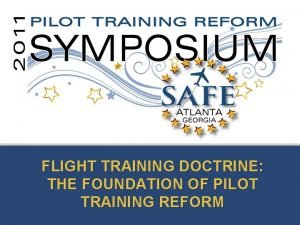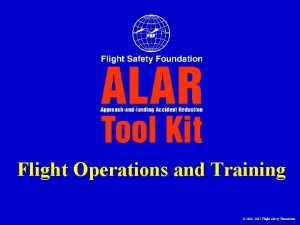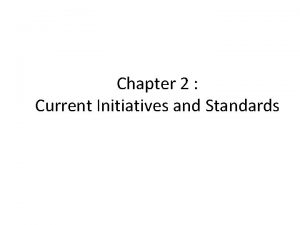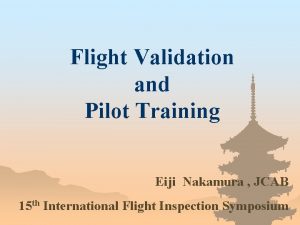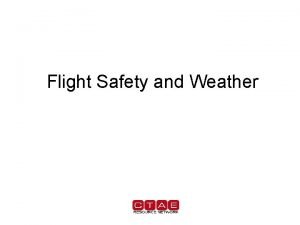FAAs Pilot Training Initiatives and Flight Standards Reorganization





























- Slides: 29

FAA’s Pilot Training Initiatives and Flight Standard’s Reorganization Federal Aviation Administration NTAS Daytona Beach, FL August 14, 2017 Robert Burke, Manager Air Carrier Training Systems and Voluntary Safety Programs, AFS-280 1

Overview • AFS-280 – An overview • Rulemaking – PPD (Mentoring) • Inspector Training, preparing for UPRT – An open invitation • ACT ARC – FAA/Industry Partnership • Flight Standards Reorganization Federal Aviation Administration 2

AFS-280 General Responsibilities AFS-280 is responsible for all regulations and guidance pertaining to part 121, 135, and 142: – – – – – Pilot, Flight Attendant, and Dispatcher Training Programs ATP Certification Training Program (ATP CTP) Advanced Qualification Programs (AQP) Flight Operational Quality Assurance Programs (FOQA) Aviation Safety Action Programs (ASAP) Voluntary Disclosure Reporting Programs (VDRP) Aviation Safety Reporting Systems (ASRS) Internal Evaluation Programs (IEP) Line Operations Safety Audit Programs (LOSA) Federal Aviation Administration 3

Federal Aviation Administration 4

Projects Ø Air Carrier Training ARC Ø Inspector Stall and Upset Training Ø PPD (Mentoring) Final Rule Ø AQP AC, Change B Ø Ops Spec Approval Training Programs Ø FSB Report Template Ø FAA/EASA/TC/ANAC Aircraft Evaluation BASA Federal Aviation Administration 5

Rulemaking – Part 121 Pilot Professional Development (Mentoring) Notice of Proposed Rulemaking (Final Rule) • • Estimated publication date is June, 2018 Will consider: − − Leadership and mentoring training for part 121 flight crewmembers Establishment of flight crewmember professional development programs Federal Aviation Administration 6

Rulemaking – Part 121 Qualification, Service, and Use of Crewmembers and Aircraft Dispatchers Final Rule • • Published on November 12, 2013 with 5 years to implement most provisions (March 2019) Amends certain regulations for part 121 training programs Requires pilot training for: − Recognizing, avoiding, and recovering from stalls; − Recognizing and avoiding aircraft upset; − Manual flying skills; − Crosswind maneuvers including wind gusts; − Pilot monitoring; and − Runway safety procedures. Requires remedial training programs for pilots who have demonstrated performance deficiencies Federal Aviation Administration 7

Rulemaking - Part 60 Change 2 and FSTD Directive #2 • Initiated to address simulator fidelity • Codified: – Full stall simulator evaluation criteria – Upset prevention and recovery training IOS enhancements – Enhanced airborne icing modeling – Published March 2016 – Effective March 2019 Federal Aviation Administration 8

Inspector UPRT Academics (5 hrs) Simulator exercises (2 hrs) Federal Aviation Administration 9

Industry UPRT Academics (5 hrs) Simulator exercises (2 hrs) Federal Aviation Administration 10

It takes a village Capt. Jon Tovani Managing Director, Flight Training Jon. Tovani@delta. com Capt. Scott Day Director of Training Scott. Day@alaskaair. com Federal Aviation Administration 11

Air Carrier Training Aviation Rulemaking Committee (ACT ARC) • Inputs • CAST Safety Enhancements • PARC Recs • NTSB Recs • Previous ARC Recs • FAA Input • Industry Input • ACT ARC • • • Advisory Circulars In. FOs SAFOs Inspector Guidance Regulations • Output s Federal Aviation Administration 12

Air Carrier Training Aviation Rulemaking Committee (ACT ARC) • FAA Designated Federal Official / Industry Chair • A 4 A • Air Carrier and Contract Training Workgroup • Training for the Unexpected Workgroup • High Energy Fire Training Workgroup • Flight Path Management Workgroup Federal Aviation Administration 13

Issues at Stake and Future Plans • Keeping pilots engaged— • Pilot monitoring training & procedures (AC 120 -71) • Maintaining pilot manual handling skills— • • Targeted skill development during training Skill retention during flight operations (SAFO 13002, SAFO 17 XXX) Federal Aviation Administration 14

Future of Flight Standards – Update By: Robert H Burke, AFS-280 Date: August 14, 2017 Federal Aviation Administration

History of Change Consistency and Standardization ARC FFS Executive Team – (developed functional model) FFS Work Group (validated a need for change) • • 110+ around Cultural Changes 60+ around Organizational Changes FFS Implementation Team – (proposed structural model) • • • Enable a small group of leaders to manage AFS Increase the functional focus for each leader Reduce functional duplication and overlap Move from Regional Model to Functional Model No Geographic Boundaries Employ and model interdependence and critical thinking Align standards and assurance Improve consistency Address 60+ improvement areas identified Federal Aviation Administration 16

Awareness: What Does AFS Need to Do Better? We need to position Flight Standards – culturally and structurally – for: Accountability to Flying Public, Stakeholders • Meet the needs of a constantly & rapidly changing industry • Fix/prevent issues (real and perceived) with consistency and standardization in regulatory interpretation Budget Constraints • • • Balance allocation of resources Increase efficient use of personnel and travel funds Reduce redundancy in regions Change Readiness to Meet Constant Stream of New Challenges • Operational efficiency & effectiveness • Organizational agility • Consistent service and performance Decision-Making – e. g. , Risk-Based Decision-Making Strategic Initiative • Culture must be ready to understand implement all aspects of risk-based decisionmaking, including Compliance Philosophy Federal Aviation Administration 17

Awareness: What Does AFS Need to Do Better? Federal Aviation Administration 18

Future of Flight Standards FFS = Organizational Change in Two Key Areas Cultural Change Develop individual competencies in: Management Change Streamline AFS structure to: Develop enterprise competencies in: • Interdependence, Critical Thinking - Consistency • Mindset / Skillset / Toolset Individual Change + • Leadership Development • Change Management • Coach Approach • Mutual Learning Enterprise Change + • Enable a small group of leaders to manage AFS • Increase functional focus for each leader • Reduce functional duplication/overlap • Align standards and implementation Structural Change Result = Organizational Health: Agility, Efficiency, Consistency to meet challenges of: Accountability, Budget, Change-Readiness, Decision-Making (e. g. , compliance) Federal Aviation Administration 19

Approach to FFS Change • Leadership Development • ADKAR • Coach Approach • Improved communication through Mutual Learning • Organizational Health • Culture Change • Interdependence, Critical Thinking , Consistency • Managed change • Mindset/ Skillset/ Toolset • Streamlined for efficiency • Avoids multiple interfaces • Specialized technical staff • integrated Surveillance • FFS • (Structural Change) Federal Aviation Administration 20

Case for Change: Current Organizational Model 21

Flight Standards Service Proposed Structure Federal Aviation Administration 22

General Aviation FSDO FSDO Federal Aviation Administration 23

Air Carrier CMO CMO CMO Federal Aviation Administration 24

Standards Operations Maintenance 400 Federal Aviation Administration 25

Foundational Resource Management A Business Workforce Development Safety Risk Management Business Standards Resource Management B Civil Aviation Registry Federal Aviation Administration 26

Flight Standards Air Carrier General Aviation Standards Foundational Business Federal Aviation Administration 27

Interdependence Rubric Risk Who How High All Sources and brief Supervisor Brief up Medium Peer, Standards and Supervisor "I intend to" Low As needed, peers and Standards Take Action Federal Aviation Administration 28

Thank you Robert Burke, Manager, AFS-280 Air Carrier Training Systems and Voluntary Safety Programs robert. burke@faa. gov Federal Aviation Administration 29
 Chapter 5 corporate liquidation and reorganization
Chapter 5 corporate liquidation and reorganization Perbedaan likuidasi partnership dan likuidasi corporate
Perbedaan likuidasi partnership dan likuidasi corporate Charlie faas
Charlie faas Oss
Oss Hematite
Hematite Reorganization energy
Reorganization energy Spatial reorganization definition
Spatial reorganization definition Literal comprehension involves
Literal comprehension involves Reorganization value adalah
Reorganization value adalah If a recreational or private pilot had a flight review
If a recreational or private pilot had a flight review Fight flight freeze fawn quiz
Fight flight freeze fawn quiz Tampa fsdo
Tampa fsdo South florida fsdo
South florida fsdo Alien flight student
Alien flight student How to maintain straight and level flight
How to maintain straight and level flight Alpine flight training
Alpine flight training Flight training management software
Flight training management software Rudder
Rudder Customer defined service standards
Customer defined service standards Delvic sanitation initiatives
Delvic sanitation initiatives Digital initiatives in higher education
Digital initiatives in higher education Crm initiatives
Crm initiatives Volkelt empathy theory
Volkelt empathy theory Business development initiatives
Business development initiatives People's initiatives
People's initiatives Nasa access management system (nams)
Nasa access management system (nams) Health initiatives
Health initiatives Service desk improvement initiatives
Service desk improvement initiatives Us soccer player development initiatives
Us soccer player development initiatives Global health initiatives meaning
Global health initiatives meaning

